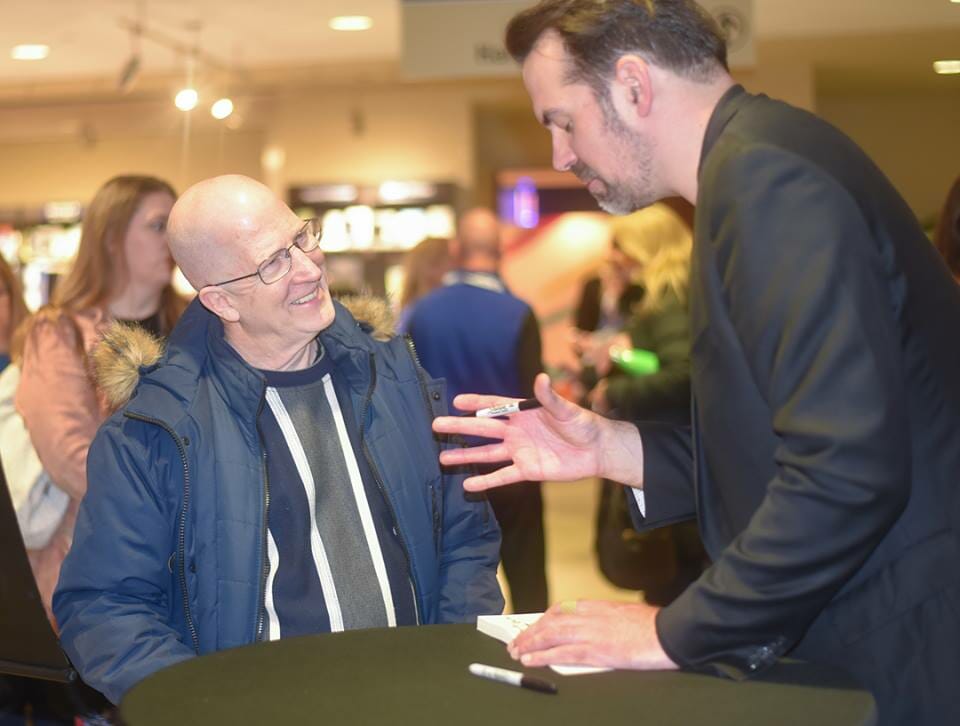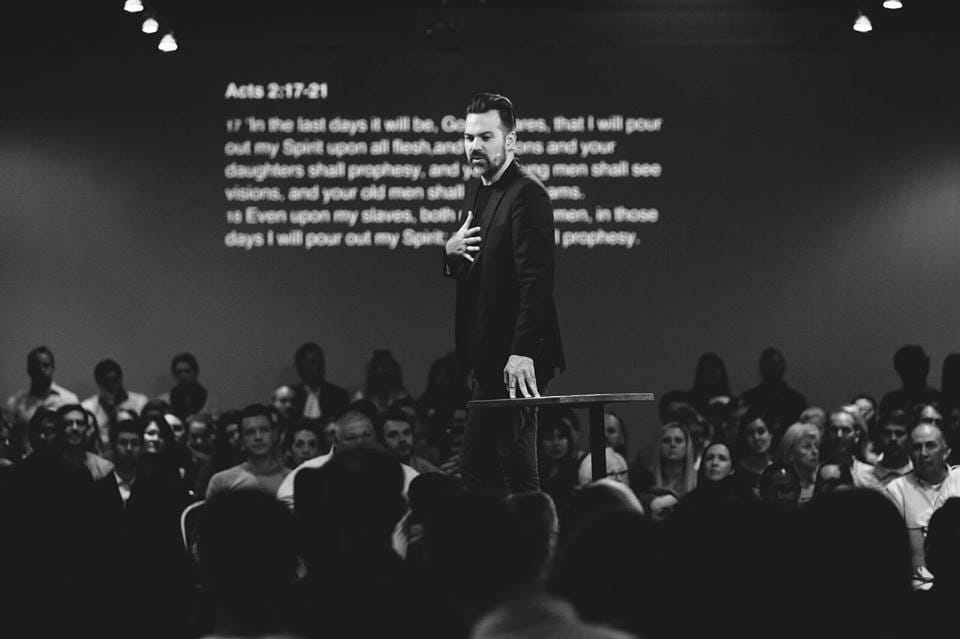Hailing from a “sweat-and-sawdust” religious background, Jonathan Martin grew up in a tent-revival, Pentecostal family where both his father and grandfather served as ministers. Describing himself as a hillbilly Pentecostal, Martin’s scope has broadened into an atmosphere that welcomes all walks of life.
“I feel like I grew up in the ‘Christ-Haunted Landscape’ with a lot of people who are colorful, like characters,” Martin said. “They were really, for the most part, wonderful people, and I feel like a lot of that is in me.”
The people surrounding Martin during his childhood instilled a fervor for spirituality in him that he is still fueled by, especially in times of trouble. After 16 years of marriage, Martin and his wife divorced, but out of the ashes of their marriage came his book, “How to Survive a Shipwreck.” Martin spent his time writing the book in the city of New Orleans.
“It is always important to me, in a creative process, to be in a place that inspires me,” Martin said. “I wrote a good bit of ‘How to Survive a Shipwreck’ there [New Orleans].”
Being in the Big Easy helped Martin in more ways than one. Martin described New Orleans as “the city beneath the sea” since Hurricane Katrina. The citizens understood the epitome of suffering yet kept the creativity and soulfulness that encapsulates the city, Martin said.
That same cultural creativity lead him to Oxford for the first time to work on the manuscript of his newest book, “The Walking Papers.”
“You have this great literary history with Faulkner,” Martin said. “I do feel like when you are an artist in a creative [process], there is something about being in a place that fosters creativity.”
Oxford is a place of a palpable sense of peace for Martin.
“There is rhythm that lulls you in, and I’m feeling that,” Martin said. “I feel like I’m breathing a little more slowly, and there is space to think and be.”
Finding a place of creativity and peace can be mutually exclusive, especially in Oxford, Martin said. While New York City is a place full of creative energy, too, Martin said it was also filled with chaos.
“I think there is something sacred about places where stuff is created and that is part of it [the sacred atmosphere] here,” Martin said.
“The Walking Papers” derives from a story found in the New Testament of the Bible where two disciples are walking to Emmaus after the Crucifixion of Jesus. There, The two disciples encountered the risen Jesus.
That’s the story that is mostly told in Sunday school, Martin said. What he never considered before was the two disciples were walking away from the city of Jerusalem, the holy city.
“They’re leaving the temple. What was once a holy place and sacred space now feels desecrated because they have experienced great pain there,” Martin said. “There is a real way that they are extensively walking away from God.”
The moral of the story is Jesus walks alongside the two disciples on their journey away from Jerusalem without their realization, Martin said. Now, the story carries an entirely new meaning for him.
“That story started connecting with me differently, because I feel like everywhere I go I am meeting people in my generation and younger who are disillusioned with the church, who are filling significantly despaired,” Martin said.
Martin believes some of those disparities have been heightened after 2016. A lot of people aren’t comfortable coming from evangelical circles, Martin said. It has given him a different framework for the journey of possibly walking away from religion.
“Sometimes despair and disillusionment is important,” Martin said. “Sometimes you need to leave the temple. Sometimes you need to leave the holy space, and doing that doesn’t mean you are walking away from God.”
The message of the newest book is centered around those who might feel these same disparities and disillusionment. It’s not about shaming them, Martin said, but finding where God is working on those journeys and whether one goes back to Jerusalem.
“God is here now. God is with you even on the walk away from God,” Martin said. “I think one thing that is cool about being in Oxford for all of this is that it is the Bible Belt. There is a lot religion and a lot of history in that regard.”
Oxford is also a place of freedom where ideas can be explored, Martin said. There are those who go to church every Sunday morning, but there are others Martin has met who spend their time on Sundays in art galleries or on Thacker Mountain.
“I identify with both of those people,” Martin said. “That’s part of what is cool about being in a place like Oxford. It makes me feel connected to that religious thing that I grew up with, but also I feel like [Oxford] is connected to some of the newer expression that resonates with me now.”
Oxford is at those intersections where religion is a part of many people’s lives, but also it is a place where people are not ashamed for believing in something different, Martin said.

Martin keeps busy with his new manuscript, but still finds time for another endeavor. His podcast, “Son of Preacher Man,” debuted just last week. The title was inspired by the song by Dusty Springfield about living a life of grit but finding grace.
“We didn’t do any advance promotion at all,” Martin said. “I joke that we dropped it like a Beyoncé record.”
Even though he doesn’t have the same audience-pull as the Grammy Award winner, there has been success with the podcast, Martin said. It currently sits at the No. 33 spot on iTunes’ religion and spiritual podcast chart.
Every episode is divided into two parts like an LP record, Martin said. Side A introduces an idea or thesis where side B is a variety of music, Q&As and live events.
Although Martin keeps busy with his writings and podcast, he still finds time to speak at events, churches and universities. He believes that being transparent with his authenticity is the most important virtue.
“When people are honest about their real human experience, there is something that is very sacred about that,” Martin said. “When I am speaking, that is what I am going for … raw and bare honesty and sharing my own soul.”
Being open with his own highs and lows of his life allows people to be more comfortable to share the ambiguity of their own journey, Martin said.
“I feel like that is kind of a holy experience whether you are advertently religious or not,” Martin said. “My theology has shifted so much in my adult life, I really do believe people are on different journeys for a reason.”
A lot of people are on the fringes of their faith, Martin said. They have either rejected it or not entirely sure if they can keep it.
“Part of why I feel like they can connect with me is that I am honest about my own doubts and my own struggles,” Martin said. “It is not ever preaching with a finger in somebody’s face. It is always, hopefully, more of a sense of being open-minded and saying, ‘Hey, we are on a journey together.’”
Martin’s book will be out toward the end of the year. You can listen to his podcast, “Son of a Preacher Man,” twice a week on iTunes. Visit his website for a listing of his events at https://www.jonathanmartinwords.com/.
By Talbert Toole, associate editor of HottyToddy.com. He can be reached at talbert.toole@hottytoddy.com.


